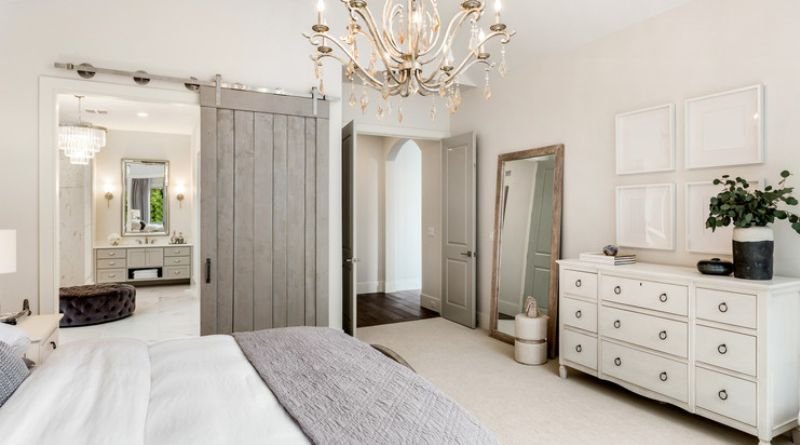The arrangement of furniture in a bedroom can have a significant impact on the overall ambiance, sleep quality, and even emotional well-being of its occupants. One of the most commonly debated design choices is whether or not to place a mirror facing the bed. This topic has sparked a variety of opinions, ranging from those who believe it can improve the room’s aesthetics to those who associate it with negative energy or poor sleep quality.
In this article, we’ll delve into the pros and cons of having a mirror facing your bed, explore cultural beliefs and feng shui principles surrounding this arrangement, and answer some frequently asked questions on the topic.
Table of Contents
What Does It Mean to Have a Mirror Facing the Bed?
Having a mirror facing the bed simply means positioning a mirror so that it reflects the person lying in bed. This could be a mirror on a wall opposite the bed, a mirrored furniture piece (such as a nightstand), or even a mirrored closet door. The placement of the mirror relative to the bed can affect the room’s energy, mood, and even your sleep.
Aesthetic Considerations
Mirrors are often used in interior design to create a sense of space and light. In small bedrooms, a mirror facing the bed might help make the room feel larger or brighter, particularly if the room lacks natural light. However, it can also make the space feel busier or overly “reflective,” which some people find unsettling.
Psychological Impact
The psychological effect of a mirror facing your bed can vary from person to person. For some, it might create a sense of unease or heightened awareness, especially if the reflection of the body in the mirror is visible while lying in bed. Others might not be bothered by this, or even find comfort in seeing a reflection as they drift off to sleep.
Cultural and Feng Shui Beliefs Around Mirrors Facing the Bed
Feng Shui: A Cautionary Principle
Feng Shui, the ancient Chinese art of arranging spaces to promote harmony and well-being, has strong opinions about mirror placement in the bedroom. According to Feng Shui principles, mirrors facing the bed are often considered bad luck. This belief stems from the idea that mirrors can reflect and disrupt the energy (or “chi”) in the room, particularly when placed directly opposite the bed.
- Energy Disruption: Feng Shui practitioners believe that mirrors can reflect energy in ways that prevent relaxation and restful sleep. The presence of a mirror might increase activity in the room, disturbing the peaceful atmosphere needed for good sleep.
- Relationship Issues: Mirrors in the bedroom can also be thought to cause disturbances in relationships. According to Feng Shui, reflecting the couple in bed can invite unnecessary tension, arguments, or even infidelity. This is why Feng Shui practitioners recommend placing mirrors in such a way that they do not reflect the bed or the people lying in it.
- Sleep Disruption: The principle of “energy disruption” is especially important in Feng Shui when it comes to sleep. A mirror facing the bed can cause subconscious restlessness, as it can give the feeling of being watched, even when you are asleep. This can lead to difficulty falling asleep or disrupted sleep patterns.
Other Cultural Beliefs
Many cultures around the world have their own interpretations of mirror placement. In some cultures, mirrors facing the bed are believed to attract negative spirits or energy. In others, a mirror facing the bed is simply seen as an aesthetic choice that doesn’t have any inherent meaning. The significance often depends on the local beliefs and customs.
Pros and Cons of Having a Mirror Facing the Bed
Pros of Having a Mirror Facing the Bed
- Aesthetic Appeal: In some cases, a mirror can be an attractive design element, reflecting light and creating the illusion of more space. This is especially beneficial in smaller rooms where the addition of a mirror can make the room feel larger and airier.
- Practicality: Having a mirror facing the bed might be convenient for individuals who prefer to check their appearance in the morning or at night before heading to sleep. It can save time and energy in getting dressed or making adjustments to clothing without leaving the bed.
- Reflection of Positive Energy: In some spiritual or esoteric belief systems, mirrors are seen as tools that can amplify positive energy. If you place the mirror to reflect the positive aspects of the room (such as a beautiful view or peaceful décor), it can potentially enhance the overall feel of the space.
Cons of Having a Mirror Facing the Bed
- Disrupted Sleep: As previously mentioned, mirrors facing the bed can cause restlessness. Even if you’re not consciously aware of it, your mind might feel more alert or on edge because of the reflected images. This can lead to difficulty falling asleep or having poor-quality sleep.
- Psychological Distress: Some people experience anxiety or discomfort from the reflection of themselves in the mirror while lying in bed, particularly if the room is dark. This sense of being “watched” can trigger a feeling of vulnerability, which can be unsettling for certain individuals.
- Energy Disturbance: In Feng Shui, mirrors facing the bed are thought to reflect energy in disruptive ways. The mirror could potentially amplify negative energy, especially if there is already tension in the relationship or room. It is also believed that mirrors reflect unresolved emotions, potentially intensifying any emotional or psychological distress.
- Relationship Strain: According to traditional Feng Shui beliefs, mirrors reflecting a bed (especially a couple’s bed) may lead to relationship problems. The idea is that the mirror acts as a third party, increasing tension or inviting outside influences. In this case, the mirror is believed to disrupt the bond between the couple and could even lead to misunderstandings or infidelity.
How to Mitigate the Negative Effects of a Mirror Facing the Bed
If you like the idea of having a mirror in your bedroom but are concerned about it facing the bed, there are a few ways to minimize any potential negative effects:
- Position the Mirror Carefully: Instead of placing the mirror directly opposite the bed, position it in such a way that it doesn’t reflect the bed while you’re lying down. Consider placing the mirror on the side wall or using a tall mirror that is angled away from the bed.
- Cover the Mirror at Night: If you don’t want to remove the mirror, you can cover it at night using a cloth or fabric. This simple solution ensures that the mirror doesn’t reflect you while you sleep, reducing the psychological discomfort that can arise from seeing your reflection.
- Use Decorative Mirrors: Opt for mirrors that are designed as decorative elements rather than functional ones. For example, framed mirrors with soft edges or mirrors designed in artistic shapes may be less jarring compared to standard rectangular mirrors.
- Choose Mirrors with Positive Symbolism: If you follow Feng Shui or similar philosophies, you can choose mirrors that reflect positive aspects of the room, such as a piece of artwork, a plant, or a beautiful light source. This ensures that the energy reflected back is more peaceful and calming.
FAQs About Mirrors Facing the Bed
1. Is it really bad luck to have a mirror facing the bed?
While there is no scientific evidence to support the idea that mirrors facing the bed are inherently bad luck, many people follow cultural beliefs or Feng Shui principles that suggest mirrors in this position can disrupt energy and cause restlessness.
2. Can a mirror cause sleep problems?
Yes, for some individuals, mirrors facing the bed can contribute to disturbed sleep. The reflection of a person lying in bed, especially in a dark room, can create a feeling of unease or make them feel “watched,” which may interfere with relaxation and sleep quality.
3. How can I make a mirror facing the bed more comfortable?
If you prefer having a mirror in your bedroom, you can mitigate its negative effects by positioning it away from the bed, covering it at night, or choosing mirrors that enhance the room’s aesthetic rather than create discomfort.
4. What does Feng Shui say about mirrors in the bedroom?
In Feng Shui, mirrors facing the bed are often discouraged. They are believed to disrupt energy, cause sleep disturbances, and even create issues in relationships. It’s recommended to position mirrors in a way that reflects positive energy and does not directly face the bed.
5. Are there any benefits to having a mirror in the bedroom?
Yes, mirrors can add depth and light to a room, making it feel larger and brighter. In some cases, mirrors can also create a feeling of openness and balance if placed thoughtfully.
Conclusion
The decision to place a mirror facing your bed ultimately comes down to personal preference and your beliefs about energy, sleep, and interior design. While some may find mirrors in the bedroom unsettling or disruptive, others may appreciate the added light and space they provide. By considering both practical and cultural perspectives, you can make an informed decision on whether a mirror facing the bed is the right choice for your space. If you do choose to have one, be mindful of its placement and consider ways to minimize any potential negative effects on your sleep and well-being.





